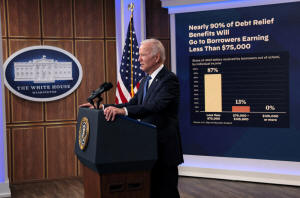Biden asks U.S. Supreme Court to pause second ruling against student
debt plan
 Send a link to a friend
Send a link to a friend
 [December 03, 2022]
By Andrew Chung [December 03, 2022]
By Andrew Chung
(Reuters) - A day after the U.S. Supreme Court agreed to hear arguments
over the legality of President Joe Biden plan to cancel billions of
dollars in student debt, his administration on Friday asked the justices
to put on hold a judge's ruling in a separate case that found the
program unlawful.
Rulings by lower courts in two challenges filed against the debt relief
program have put Biden's policy on ice.
The administration on Friday asked the Supreme Court to pause
Texas-based U.S. District Judge Mark Pittman's decision in a challenge
backed by a conservative advocacy group or to hear arguments on the
merits of the case at the same time that it tackles a challenge pursued
by six mostly Republican-led states.
Pittman issued his ruling on Nov. 10. The St. Louis-based 8th U.S.
Circuit Court of Appeals issued its injunction on Nov. 14 in a lawsuit
in which Arkansas, Iowa, Kansas, Missouri, Nebraska and South Carolina
have argued that the administration overstepped its authority.
The justices on Thursday did not act on Biden's request to immediately
lift the 8th Circuit's injunction but fast-tracked the case for oral
arguments in late February or early March.

Biden announced in August that the U.S. government would forgive up to
$10,000 in student loan debt for borrowers making less than $125,000 a
year, or $250,000 for married couples. Students who received Pell Grants
to benefit lower-income college students will have up to $20,000 of
their debt canceled.
During the 2020 presidential campaign, Biden promised to help
debt-saddled former college students but the program has drawn
opposition from Republicans and conservative groups who say it is unfair
to those who paid back their loans or never went to college and could
exacerbate inflation.
The Congressional Budget Office in September calculated that the debt
forgiveness program would cost taxpayers about $400 billion.
[to top of second column]
|

U.S. President Joe Biden delivers
remarks about the student loan forgiveness program from an
auditorium on the White House campus in Washington, U.S., October
17, 2022. REUTERS/Leah Millis/

The Texas lawsuit was filed by two borrowers who were partially or
fully ineligible for the loan forgiveness, backed by the Job
Creators Network Foundation, a conservative advocacy group founded
by Bernie Marcus, a co-founder of Home Depot Inc.
Pittman, appointed as a judge by Republican former President Donald
Trump, ruled that the administration overstepped its authority to
order debt cancellation under a 2003 law called the Higher Education
Relief Opportunities for Students Act, which can "waive or modify"
student financial assistance during war or national emergency.
The judge said it was irrelevant if Biden's plan was good public
policy because the program was "one of the largest exercises of
legislative power without congressional authority in the history of
the United States."
Biden's administration justified its plan based on the economic
harms inflicted by the COVID-19 pandemic and concerns about rising
debt delinquency and lower earnings, particularly among lower-income
Americans. Biden and his predecessor Trump had invoked the law to
pause student loan repayments.
Biden on Nov. 22 extended the repayment pause to no later than next
June 30 to give the Supreme Court time to decide the case.
The administration has said that more than 26 million borrowers have
applied for loan relief and 16 million applications have been
approved for discharge if allowed by the courts. It has said more
than 40 million Americans are eligible for relief.
(Reporting by Andrew Chung; Additional reporting by Nate Raymond;
Editing by Will Dunham)
[© 2022 Thomson Reuters. All rights
reserved.]
This material may not be published,
broadcast, rewritten or redistributed.
Thompson Reuters is solely responsible for this content. |